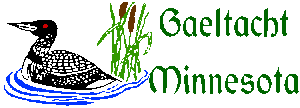
An Triail
During the winter "term", we'll be focusing most of our attention on the play An Triail, by Máiréad Ní Ghráda. This separate section of the site will allow you to quickly see what you have missed on any given night.
|
03/02/05 |
Playwright |
Timeline | Themes.| Triail Start |Back to Will's Class |
A brief biography, as Gaeilge, was provided on Feb. 14. We'll look at that a little more on the 7th of March..
|
Year
|
Events
|
 |
|
1896 |
|
|
|
1913 |
|
|
|
1918 |
|
|
|
1919 |
|
|
|
1920 |
|
|
|
1921 |
|
|
|
1923 |
|
|
|
1926 |
|
|
|
1929 |
|
|
|
1931 |
|
|
|
1935 |
|
|
|
1937 |
|
|
|
1938 |
|
|
|
1939 |
|
|
|
1940 |
|
|
|
1942 |
|
|
|
1964 |
|
|
|
1968 |
|
|
|
1971 |
|
We talked about some interesting elements of her timeline. As we learn more about Ní Ghráda, look for these characteristics:
Finally, she doesn't so much defy expectations of her times as just march right past them. Very much a career woman, who raised two sons. Writing a play about the injustice of the treatment, by her community, of a young unwed mother -- when she herself is in her late 60s. Hired to put together children's programs on the radio, she becomes the first woman in the British Isles to be the lead announcer of a national radio service.
There is a list of works in the front of the script, and it doesn't begin to cover her educational works.
Had you heard of this writer before we started the play? There's one well-known book from her educational works that isn't mentioned in the list of her works.
| If you can't guess what book I'm talking about, put your cursor here: |
Progress
in Irish
|
Any questions or comments, drop me an e-mail.